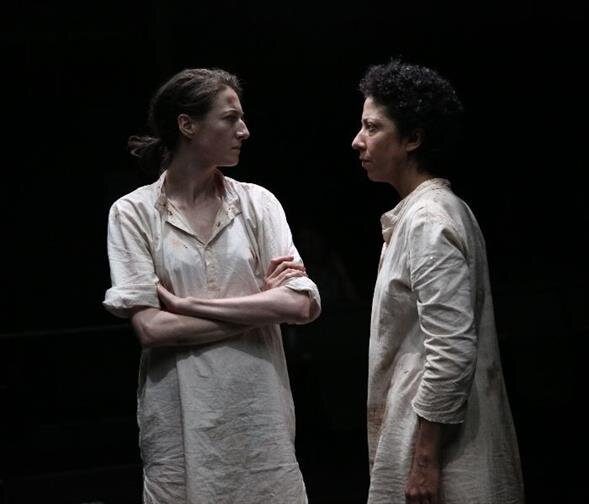How a Planned Rom-Com Transformed Into a Serious Exploration of Captivity
Renata Friedman and Sarah Nina Hayon
Originally published on TDF Stages
View this story online
For years Winter Miller has been telling her playwriting students to "follow your yes," encouraging them to trust their instincts. For her new drama No One Is Forgotten at Rattlestick Playwrights Theater, she found herself taking her own advice — not just as a playwright, but as a first-time director and producer, too.
The taut two-hander centers on an aid worker and journalist (Renata Friedman and Sarah Nina Hayon) who are being held captive in a windowless cell. Exactly where or why they're imprisoned is never explained. Instead, the chilling one-act explores what they do to survive as they struggle with intimacy, sanity and mortality. It's shocking to discover that the play originally started out as a romantic comedy, and there's quite a story behind its transformation.
Over her two-decade career as a dramatist, Miller has usually gravitated toward weighty subjects such as abortion (Spare Rib), gender fluidity (The Penetration Play) and genocide (In Darfur). The latter was inspired by her travels to the Sudan border when working as a research assistant to New York Times columnist Nicholas Kristof.But while her scripts were frequently praised, they were rarely produced in New York. "I had been creating plays that were, to me, political and thoughtful, and I was really excited by what I was writing," Miller recalls. "But they weren't being embraced by theatres."
The many rejections led Miller to try her hand at penning something lighter: a two-person rom-com about a biracial, heterosexual couple. "I was trying to think of as many groups as possible in the mainstream that I could welcome," Miller says. "That was my goal: I wanted to get something up on stage."But as she began writing, the story went in an unexpected direction."
No One Is Forgotten wasn't the play I set out to write, but it's the play that came," says Miller. "It just came tumbling out super quickly. I followed my own teachings and I said 'yes' to the characters that showed up and what they were doing."Miller soon realized that No One Is Forgotten was being influenced by her experience at The Times, where she witnessed international correspondents preparing for unknown dangers. She remembers being particularly shaken by the kidnapping and public beheading of The Wall Street Journal's Daniel Pearl.
"I found it really haunting," she says. "I started thinking about all these people who go out and do their jobs, knowing there was no guarantee that they would make it out alive. All of that time of thinking about people in captivity and what they would do came out in this play."While the writing went smoothly, getting the play produced did not. Despite being warmly received at multiple workshops, no one bit. Frustrated, Miller decided to mount it herself.
She reached out to her industry friends for guidance. Tony-winning director Pam Mackinnon allowed Miller to watch her rehearse a production of Seascape in San Francisco. Tony-nominated actress Kathleen Chalfant encouraged Miller to start fundraising and became her first donor. Within a few months, Miller assembled the $70,000 she needed via various sources, including a successful Kickstarter campaign.
Being in charge of the production both artistically and financially let Miller build the diverse team she wanted. More than 90 percent of her collaborators are women, people of color, queer, trans or some combination thereof, and she's paying them above scale. In fact, 60 percent of the budget is going to their salaries.
"To me that's super meaningful," Miller says. "I created jobs where there weren't jobs. We didn't spend it on an expensive set. The value of people over things makes me really glad."
While she admits she's had moments of doubt during her No One Is Forgotten journey, Miller says following her yes keeps getting her through. Being both the playwright and the director has helped, too."
There are things I don't have to explain to the director because the playwright already knows them," she says with a laugh. "And I can always get the playwright on the phone. I can make cuts in the moment and not have to clear them with anyone or run them by a committee. I can trust my instincts."

